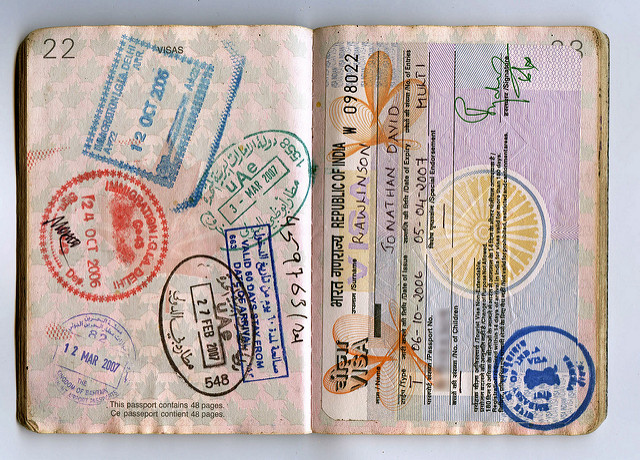
Image by Conservation Africa courtesy of Gapwork.com
If you fancy a long-term change of scenery but don’t have the funds to travel the world for a whole year, you could always work overseas instead. Working whilst travelling is totally possible, and incredibly enjoyable – all it takes is a little planning…
How long is temporary?
The length of time a UK resident can work abroad is about the same length as a piece of string – it varies! It can depend on the type of work you are doing as well as the country you are doing it in, but generally speaking, anything under a year is temporary. You should make sure you check what your travel insurance provider thinks though.
“An Australia Working Holiday Visa lasts for up to a year, so anything within this period would count as temporary.” David Owen, Gapyear.com
Some travel insurance policies place restrictions on the period of time a person spends in any one place so this can be a problem if someone has a work placement overseas. WorldwideInsure.com don’t place this type of restriction so long as the person travelling is on a temporary contract and returning to the UK at the end of the trip.
Deciding where to go and what to do
Chances are you either have your heart set on a specific destination and don’t mind what work you do there, or you know exactly what you want to do and don’t mind where you do it. If you are totally undecided, then it may be worth taking a look at what jobs are available on the many websites dedicated to advertising work overseas, such as Season Workers which covers a wide range of jobs in different sectors, Natives which focuses on jobs at ski and snowboard resorts, or E4s, which is a site dedicated to student jobs.

Image by EA Ski courtesy of Gapwork.com
10 best places to work abroad
- New Zealand – It comes top in quality of life surveys.
- Singapore – Very clean, very low crime, English is an official language.
- Switzerland – Low taxes and high quality living.
- China – Low living costs, excellent place for TEFL.
- Hong Kong – A great place for foreigners to feel at home.
- India – Money goes a long way here, and the jobs market is really opening up.
- Ecuador – Low cost of living and very pleasant weather.
- Thailand – Low cost of living, beautiful scenery, perfect place to teach English.
- Belize – Locals speak English, every pound goes a lot further than in the UK.
Going solo or go with a season worker specialist?
There are specialist websites that are chock-a-block with information and advice about arranging your own temporary work or gap year. Gapwork.com is one such resource, with plenty of independent information on all options available. You can search by job or destination, and there are plenty of helpful planning resources.
If taking it all on sounds too daunting, which it might if this is your first time working abroad, you’ll probably enjoy the peace of mind you’ll get from a programme provider such as Gapyear.com. They can help with all the planning involved in a trip and handle all the booking, which is especially important if you are travelling to a few locations. The main advantage of going through a company like Gapyear.com is knowing that everything will be in place, as described, when you arrive, as the programmes will be regulated and travel providers thoroughly vetted! They are also on hand if you need to call someone for help or advice.
Get a job first – or wing it?
If you really like flying by the seat of your pants, you could head off on your extended holiday, and worry about the job (and sorting the visa) later, but be warned – arranging a working visa on the move could be difficult. On that note…
Visas
Different countries have different visa requirements, so do your research first!
Don’t be tempted to work on your holiday visa, even if you find work with someone who will overlook the fact you don’t have the right visa – if discovered, you could be fined, prosecuted, deported and may even be barred from re-entering that country. There could be harsh consequences for your employer too!
The only way you could work abroad on a holiday visa is if you are a Digital Nomad and all your clients are in the UK paying into your UK bank account. Novelist Adam Sprode has been working as a freelance blogger whilst travelling for the last few years. “I write for a few UK clients, which keeps me in food and beer, and pays for a roof over my head without having to work full time. This leaves plenty of hours to appreciate the country I am in, and also work on my next novel.”
The only solid answer to visa questions is to ALWAYS CHECK THE VISA SITUATION BEFORE YOU TRAVEL! Check out this visa planner from Gapyear.com for starters.

Passport Pages by Jon Rawlinson CC BY 2.0
5 most difficult places to get a visa
- North Korea – Tourists from many countries will find entry difficult. Even if you can get in, you will quite likely have a “guide” watching your every move.
- Russia – A long process that also requires that you be invited to stay. Warning: leaving the country if your visa has expired could be even more difficult!
- Democratic Republic of Congo – Dogged by red tape, and unofficial fees it is a lengthy process to get into this very dangerous part of the world.
- Saudi Arabia – At certain times of year non-Muslims face lots of questions on why they are travelling. Women be warned… lone females must be met by a sponsor or male relative.
- USA – You’ll find it nigh-on impossible to get a visa if you have a criminal record of any sort. If you’ve been convicted of a drug-related offence, then this country is a no-go.
Selling or storage?
Unless you live at home with your parents, you are going to have to do something with your belongings. Your choices are:
- Keep them where they are – easy, but expensive, and maybe risky too.
- Sell them all it’s only “stuff” – essential if you need to fund your travels until you start work.
- Sell some and store some – the most likely option.
- Take everything with you – really only suitable if you are relocating.
If you own your own home, you probably don’t want to leave personal belongings either unattended, or with someone you don’t know renting your property, and if you are renting, it is actually more cost effective to put your things into storage.
“If you’re going to be out the country for a significant amount of time, it doesn’t make sense to keep paying rent; a self storage unit is by far the cheaper – and safer – option, starting from just £15 a week. Sue Bailey, director Easy Access Self Storage
But what about the things you need? Whilst backpacking is a great experience, some people setting off to work overseas want to take their belongings with them, in fact, depending on what they plan to do overseas, they may need to take some big things with them…..
Shipping possessions by sea and air
Yoga teachers with bags of bricks and mats, musicians with multiple instruments, gamers with precious technology, snowboarders and skiers with erm, snowboards and skis – sometimes there are big things that need transporting that just won’t fit in a suitcase! We spoke with International removal expert Pickfords to find out when you should ship your stuff by air, and when you should ship by sea…
“Firstly, send the bulk of your big and heavy items, such as furniture, by sea, this is by far the cheaper option, but also slower. If you have any hobbies that require large equipment such as musical instruments or skiing or snowboarding apparatus, send these by sea as well, alongside items like televisions and games consoles. These items will be loaded and sealed into a metal container (which is large enough to transport the contents of a three-bedroom house) and then delivered directly to the port.
For items that you’re going to need closer to hand, arrange an airfreight, which offers a much faster transit time. Airfreight is charged per kilo and is a lot more expensive than sea freight, but ensures essential items will get to you exactly when you need them, making it perfect for items that you’ll struggle to do without. It would be incredibly expensive to send all of your belongings via airfreight, but it’s perfect for the items you need.”

Image by Raleigh International courtesy of Gapwork.com
Travel insurance
If you are planning to work while you are overseas, you must make sure that your insurance policy allows it, as some policies exclude working altogether. WorldwideInsure.com’s Longstay Travel Insurance covers business trips and working abroad on a temporary contract, however the Standard policy does not. The Longstay option can also be purchased while travelling if you discover that yours has run out!
Knowing which policies cover working and which don’t is especially important if you are comparing different policies on the market. You should also take note what type of work is covered. For example, while most types of work are covered in a WorldwideInsure.com Longstay policy, some manual* work is not.
We do however cover some manual work** that travellers commonly take up such as:
- Fruit picking
- Bar work
- Waiting
- Catering
- Singing
- Playing in a band
- Supervised conservation work
- Voluntary labouring
- Supervised animal sanctuary work
(Please see information below or call 01892 833338 for specific details.)

Image by Raleigh International courtesy of Gapwork.com
Bank accounts
Not the most exciting aspect of planning a mega-trip abroad, but definitely important – should you open a local bank account, or should wages be paid into a UK account? Well, if you are paid in the local currency and it goes to a UK account, you will be charged an exchange rate, which isn’t the savviest of money-saving ideas.
“Some work placements will require you to have a local bank for payments. You will need a letter from your employer to be able to open one as well as all-essential passport and visa paperwork.” Linsey MacLeod, Gapwork.com
A local bank account for some jobs however is mandatory, so make sure you speak with your job provider – many working holidays come complete with help setting up a local account anyway. You should also have a chat with your UK bank, they may offer international bank accounts.
“There are some jobs, such as bar work, that might be paid cash in hand, but these are increasingly rare and a traveller shouldn’t rely on that!” David Owen, Gapyear.com
What about taxes?
As if the bank stuff wasn’t boring enough eh? But really, you don’t want to mess with the tax man! As you are overseas temporarily, you will still be classed as a UK resident, so will be liable to pay tax. You may also find that you are taxed on your earnings in the country in which you are working.
Yowch!
Don’t worry, travellers can usually claim tax relief and make sure they aren’t taxed on the same income twice. The trusty Gov.UK website has lots of information, however if the whole thing gives you a bit of a headache, you can turn to the services of a dedicated financial advisor such as taxsafe.uk.com who specialise in offering tax advice for Britons working abroad.

Koh Tao Thailand by Nick Kenrick CC BY 2.0
Don’t forget the spirit of adventure!
Whichever way takes you in your chosen direction, it is what you get up to and how you get up to it when you are out there that counts. Ok, you are going abroad to work, but that doesn’t mean you should forget to have an adventure, as these wise words from travel writer Lloyd Figgins reminds us…
“I’ve been fortunate enough to live and work overseas for much of my life and had so many positive experiences. That’s partly because I have embraced my time living in a new country and made a point of getting off the beaten track, rather than simply becoming part of the local ex-pat community. Not that there’s anything wrong with that, but the rewards of immersing yourself in a culture can open doors, which might otherwise remain closed. I’ve had coffee with elders in a remote village on the top of a mountain in Oman, joined a dawn bush walk with tribesmen in Kenya and was even the guest of honour at a wedding in Uzbekistan. Get out there and discover your environment, but do it safely. Do your research, prepare well and always make sure you let someone know where you’re going and when you expect to be back.”
Lloyd Figgins is an international expert in travel safety and author of Looking for Lemons, £9.99 available from Amazon.

Ready to take the next step and get your travel insurance sorted? Get an online quote at WorldwideInsure.com or give one of our team a call on 01892 833338.
******
The small print…
* Manual work means work that involves;
- hands-on use, installation, assembly, maintenance or repair of electrical, mechanical or hydraulic plant, heavy power tools and industrial machinery, and
- hands-on electrical and construction work or work above two storeys or 3 metres above ground level (whichever is the lower), building sites, any occupation involving heavy lifting;
**The exclusion of manual work does not apply to work that is:
- purely managerial /supervisory, sales or administrative capacity;
- bar, restaurant and catering trade staff, musicians and singer;
iii. Fruit pickers (who do not use heavy machinery), casual light work, light agricultural work; supervised conservation work, voluntary charity work labour where there is no financial gain; in such circumstances there will be no cover for hands-on involvement with the installation, assembly, maintenance, repair or use of electrical, mechanical or hydraulic plant, heavy power tools and industrial machinery, or work above two storeys or 3 metres above ground level (whichever is the lower).
- supervised animal sanctuary work but no cover can be provided in relation to any interaction with dangerous wild animals such as lions, tigers or big cats of any kind.
